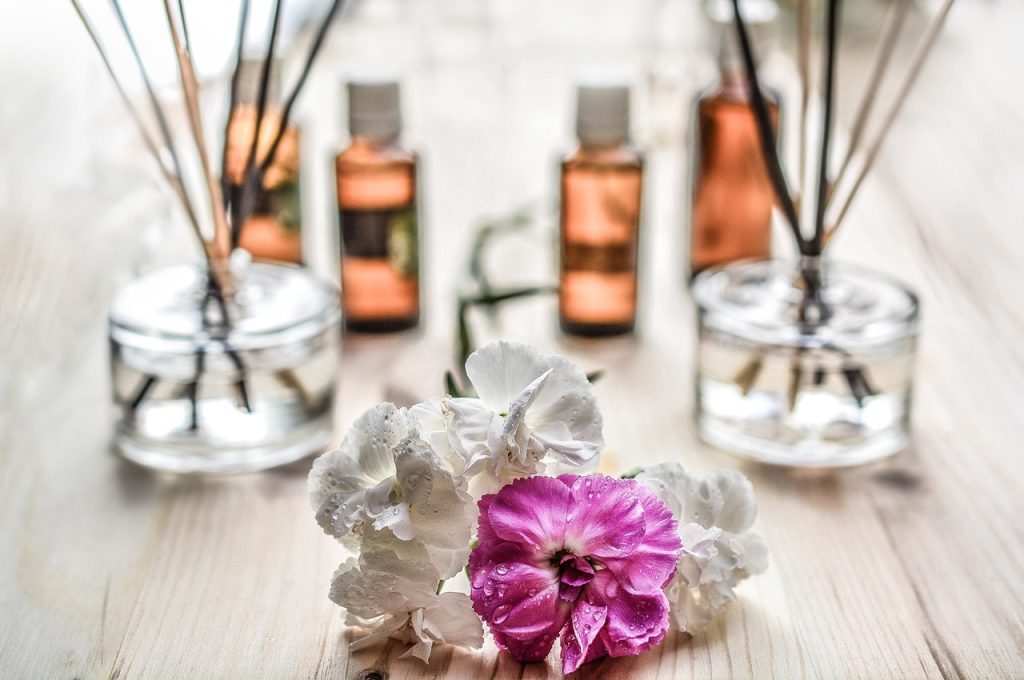Smell is a powerful sense and it is often underrated. Scent impacts how we perceive our environments, how we interact with others, how we enjoy the food we eat, and it can aid memory recall. We form the basis of what we like and don’t like for smells in our childhood. Scents can help lift our moods. They can also trigger a negative response. Certain scents will appeal more to us than others. In fact, what one person absolutely adores, another can have outright disgust towards. Some of this is based on our own sensitivities tied to our olfactory capabilities, and differences in how our brains process memories tied to those scents, if any. The nostalgic ability of scents can also help reinforce our sense of self, promoting overall well-being.
Your Nose as a Compass
Using an electroencephalograph (commonly known as an EEG), scientists have been able to show how different fragrances affect brain activity and cognitive function. By testing different types of smells, they are able to derive normative results for certain scents. This can guide you in using scents to improving your well-being, and hence, create a shift in perception.
When you inhale, you move tiny molecules into your nose. These molecules are detected by olfactory receptors that are located in our nasal cavity. They send a signal to the limbic system, which in turn relays information about what you perceive the smell to be. This is based on prior exposure, the foundation of which starts in childhood. The limbic system also regulates emotion, memory, and behaviour. This is why smells can so easily trigger a reaction in you.
Why Does Smell Matter?
Loss of Smell
An interesting fact about our olfactory neurons is that they regenerate over our lifetime. When someone experiences anosmia, they have lost their sense of smell. Their ability to smell again could potentially return due to this regenerative trait, as long as there isn’t permanent damage or lesions to the olfactory nerve. This has been a topic of research since the COVID-19 pandemic. Many who acquired the infection suffered long-term loss of smell.
Long-term or permanent loss of smell is critical to quality of life. It impacts our ability to enjoy the food that we eat. We have all experienced this when we get the common cold or allergies. This loss is a result of inflammation in the nasal cavity, and without smell, you significantly reduce your ability to taste. Remember the last time you lost your sense of smell and taste? Remember how good it felt to regain them? Anosmia can be dangerous. It impacts your ability to detect chemical or gas leaks, or smell spoiled food prior to eating it.
High Sensitivity
There are also people who are highly sensitive to smells, this is called hyperosmia. This can be a temporary condition due to the onset of a migraine, or be long-term due to certain autoimmune neurological conditions. Having an intensified ability to sniff out scents can be challenging for some individuals. Some even get nauseous from strong smells. Chemicals like synthetic fragrances, perfumes, and cleaning products can trigger mild to severe discomfort. In some cases, this can also trigger anxiety and depression. On the flip side, some super sniffers make their life’s work perfecting fragrances for the beauty and well-being industries.
Triggers
People can be positively and negatively triggered by certain smells. Baked apple pie always takes me back to granny’s kitchen. Negative scent triggers are more prevalent with PTSD or panic disorders sufferers. This can cause panic attacks or flashbacks. This is evidenced in veterans when exposed to the smell of blood, gun powder, burning rubber, or diesel, all reminders of war. Certain scents can produce a calming effect for people in distress. The grounding effect of scents is being explored in therapy for PTSD. This is especially helpful for emotionally charged memories. Scents are also being used to augment exposure therapy to reduce the intensity of the triggers and the respective memories.
Aromatherapy
Aromatherapy is the use of essential oils as a natural remedy to improve well-being through the sense of smell. It has seen an increase in popularity for the reduction of stress, anxiety, and depression, and to promote a good night’s sleep. Some people apply diluted essential oils on their skin via a carrier oil like coconut or jojoba. Always do your research first and do a small patch test to ensure you don’t have a severe reaction when trying something new. The most common method of aromatherapy is inhalation, either directly from the source or by using a diffuser to infuse the air in a room.

Caution: Essential oils are not regulated. It is not recommended that you ingest them. Be aware of risks before using them. Essential oils are not recommended for children, and are not safe for pregnant or breastfeeding women. There is also potential toxicity for pets.
Commonly Accepted Properties of Essential Oils
The molecules we inhale have unique compositions which is how you can notice why some things smell a certain way. Below are four main categories for types of smell that are used by the fragrance industry:
- Floral – this includes sweet smells, flowers, fruity, and powdery notes. Examples include roses, jasmine, iris, tropical fruits, and peaches.
- Ambery – this includes spices and resin notes. Examples include cinnamon, vanilla, anise, patchouli, frankincense, and musks.
- Woods – this includes mossy woods, leather, and smoky notes. Examples include sandalwood, vetiver, cedarwood, oud, and oakmoss.
- Fresh – this includes citrus notes, as well as greens, herbs, and water. Examples include lemon, mandarins, sage, lavender, freshly mowed lawns, the sea or rain.
Essential oils such as lavender and chamomile are known for their calming effect. Use them to wind-down or engage in meditation. In general, florals tend to evoke feelings of happiness and relaxation. Citrus scents like lemon and orange boost people with energy and improve mood. Peppermint invigorates and refreshes, not just your breathe, but your mind too. Earthy scents like sandalwood, patchouli, leather, and tobacco are commonly associated with masculinity. They also create a calming effect. Vanilla’s sweet smell reduces stress and anxiety. And many find the smell of fresh-cut grass joyful.
What smells make you feel good?
Commercial applications of fragrances are well-known to increase spending among consumers and influence how they perceive certain environments, increasing profit margins for businesses across markets. The film industry incorporates special effects into movie theatres, including smells to enhance the story on screen. Hotels infuse filtration systems with sweet, tropical scents to help transport vacationers to their destinations. Scent has become a marketing differentiator for brands in a crowded marketplace of consumerism.
You don’t have to spend a fortune to find a way to bring scents into your routine, improving your quality of life. Be conscientious of what products you choose for your hygiene (scented or fragrance-free). Notice the smell of your favourite foods. Infuse your spaces with scented candles or a diffuser. And don’t forget to stop and smell the roses.
There are universally accepted smells, at the end of the day, what you like is unique to you. Once you know which scents appeal to you, you can use them to uplift your mood, improve your working capacity, and reduce stress, anxiety, or depression. Remember that taste is closely related to our ability to perceive scents so if your food isn’t tasting like much, you might be getting sick. Listen to the signals that your body is sending, increase nutrients, hydrate, and rest up.
IMAGE CREDITS: Feature image – Unsplash | Motunrayo Babatunde. Article image – Pixabay | Monicore.

